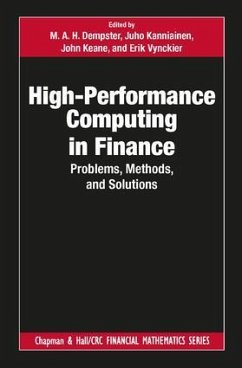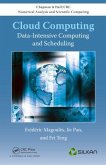High-Performance Computing in Finance
Problems, Methods, and Solutions
Herausgeber: Dempster, M. A. H.; Keane, John; Kanniainen, Juho
High-Performance Computing in Finance
Problems, Methods, and Solutions
Herausgeber: Dempster, M. A. H.; Keane, John; Kanniainen, Juho
- Gebundenes Buch
- Merkliste
- Auf die Merkliste
- Bewerten Bewerten
- Teilen
- Produkt teilen
- Produkterinnerung
- Produkterinnerung
High-Performance Computing (HPC) delivers higher computational performance to solve problems in science, engineering and finance. There are various HPC resources available for different needs, ranging from cloud computing- that can be used without much expertise and expense - to more tailored hardware, such as Field-Programmable Gate Arrays (FPGAs) or D-Wave's quantum computer systems. High-Performance Computing in Finance is the first book that provides a state-of-the-art introduction to HPC for finance, capturing both academically and practically relevant problems.
![Cloud Computing Cloud Computing]() Frederic MagoulesCloud Computing255,99 €
Frederic MagoulesCloud Computing255,99 €![Anyone Can Code Anyone Can Code]() Ali AryaAnyone Can Code209,99 €
Ali AryaAnyone Can Code209,99 €![Machine Learning for Cloud Management Machine Learning for Cloud Management]() Jitendra KumarMachine Learning for Cloud Management199,99 €
Jitendra KumarMachine Learning for Cloud Management199,99 €![Semisupervised Learning for Computational Linguistics Semisupervised Learning for Computational Linguistics]() Steven AbneySemisupervised Learning for Computational Linguistics223,99 €
Steven AbneySemisupervised Learning for Computational Linguistics223,99 €![Information Technology Information Technology]() Richard FoxInformation Technology275,99 €
Richard FoxInformation Technology275,99 €![Object-Oriented Design Choices Object-Oriented Design Choices]() Adair DingleObject-Oriented Design Choices212,99 €
Adair DingleObject-Oriented Design Choices212,99 €![Advanced Data Structures Advanced Data Structures]() Suman SahaAdvanced Data Structures222,99 €
Suman SahaAdvanced Data Structures222,99 €-
-
-
Hinweis: Dieser Artikel kann nur an eine deutsche Lieferadresse ausgeliefert werden.
- Produktdetails
- Verlag: Chapman and Hall/CRC
- Seitenzahl: 638
- Erscheinungstermin: 12. März 2018
- Englisch
- Abmessung: 240mm x 161mm x 38mm
- Gewicht: 1112g
- ISBN-13: 9781482299663
- ISBN-10: 1482299666
- Artikelnr.: 43033294
- Herstellerkennzeichnung
- Books on Demand GmbH
- In de Tarpen 42
- 22848 Norderstedt
- info@bod.de
- 040 53433511
- Verlag: Chapman and Hall/CRC
- Seitenzahl: 638
- Erscheinungstermin: 12. März 2018
- Englisch
- Abmessung: 240mm x 161mm x 38mm
- Gewicht: 1112g
- ISBN-13: 9781482299663
- ISBN-10: 1482299666
- Artikelnr.: 43033294
- Herstellerkennzeichnung
- Books on Demand GmbH
- In de Tarpen 42
- 22848 Norderstedt
- info@bod.de
- 040 53433511
Computationally Expensive Problems in Investment Banking 2. Using Market
Sentiment to Enhance Second-Order Stochastic Dominance Trading Models 3.
The Alpha Engine: Designing an Automated Trading Algorithm 4. Portfolio
Liquidation and Ambiguity Aversion 5. Challenges in Scenario Generation:
Modeling Market and Non-Market Risks in Insurance Part II: Numerical
Methods in Financial High-Performance Computing (HPC) 6. Finite Difference
Methods for Medium- and High-Dimensional Derivative Pricing PDEs 7.
Multilevel Monte Carlo Methods for Applications in Finance 8. Fourier and
Wavelet Option Pricing Methods 9. A Practical Robust Long-Term Yield Curve
Model 10. Algorithmic Differentiation 11. Case Studies of Real-Time Risk
Management via Adjoint Algorithmic Differentiation (AAD) 12. Tackling
Reinsurance Contract Optimization by Means of Evolutionary Algorithms and
HPC 13. Evaluating Blockchain Implementation of Clearing and Settlement at
the IATA Clearing House Part III: HPC Systems: Hardware, Software, and Data
with Financial Applications 14. Supercomputers 15. Multiscale Dataflow
Computing in Finance 16. Manycore Parallel Computation 17. Practitioner's
Guide on the Use of Cloud Computing in Finance 18. Blockchains and
Distributed Ledgers in Retrospective and Perspective 19. Optimal Feature
Selection Using a Quantum Annealer
Computationally Expensive Problems in Investment Banking 2. Using Market
Sentiment to Enhance Second-Order Stochastic Dominance Trading Models 3.
The Alpha Engine: Designing an Automated Trading Algorithm 4. Portfolio
Liquidation and Ambiguity Aversion 5. Challenges in Scenario Generation:
Modeling Market and Non-Market Risks in Insurance Part II: Numerical
Methods in Financial High-Performance Computing (HPC) 6. Finite Difference
Methods for Medium- and High-Dimensional Derivative Pricing PDEs 7.
Multilevel Monte Carlo Methods for Applications in Finance 8. Fourier and
Wavelet Option Pricing Methods 9. A Practical Robust Long-Term Yield Curve
Model 10. Algorithmic Differentiation 11. Case Studies of Real-Time Risk
Management via Adjoint Algorithmic Differentiation (AAD) 12. Tackling
Reinsurance Contract Optimization by Means of Evolutionary Algorithms and
HPC 13. Evaluating Blockchain Implementation of Clearing and Settlement at
the IATA Clearing House Part III: HPC Systems: Hardware, Software, and Data
with Financial Applications 14. Supercomputers 15. Multiscale Dataflow
Computing in Finance 16. Manycore Parallel Computation 17. Practitioner's
Guide on the Use of Cloud Computing in Finance 18. Blockchains and
Distributed Ledgers in Retrospective and Perspective 19. Optimal Feature
Selection Using a Quantum Annealer








